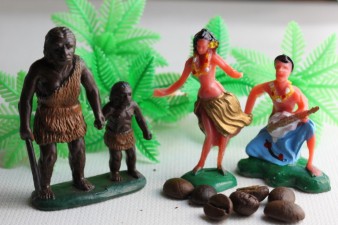Imagine you’re at the beach. You slide on your sunglasses and spread a towel out on the sand. The sun beats down. Your skin feels hot, so you apply sunscreen. At first you enjoy the sun but as the afternoon wears on, you flee, back to the car and eventually home to an air-conditioned house. As you change clothes, you admire your tan.
You’ve just demonstrated the remarkable human ability to adapt, both biologically and by inventing things that change our surrounding conditions.
Human adaptation is key to our success. Our skin releases melanin to protect against the sun’s rays. We build shelters to keep out wind, rain, and varmints. Our machines change the temperature of the air. Our ability to cope with the variability of our environment is our biggest advantage. And somehow these things, these adaptations, just flow together over time: we’re not always aware of how we come to cope. We just do.
Is Caffeine an Adaptational Tool?
In so many ways, caffeine makes humans more adaptable. With caffeine, we can avoid sleep. Day can be night, and night can be day. We can ward off hunger and fatigue. We’re more social and exchange ideas. We solve problems, and make things all day long. And when we feel pain, caffeine stops the hurt and keeps us going.
Why do we include caffeine in our diet? It doesn’t provide calories, fat, or protein. It does stimulate neurochemicals that change how we interact with our environment. It’s a source of antioxidants, and it’s delivered in natural substances that contain even more antioxidants. Perhaps we choose caffeine because in some ways, it helps us more than it harms us.
 Caffeine’s effects may be making more of a long-term impact than we can easily see. But the fact that most people experience caffeine on a regular, daily basis suggests we may be operating differently, in some big-picture way, from times when caffeine was not widely consumed.
Caffeine’s effects may be making more of a long-term impact than we can easily see. But the fact that most people experience caffeine on a regular, daily basis suggests we may be operating differently, in some big-picture way, from times when caffeine was not widely consumed.
Caffeine can be a powerful tool in the human toolbox. But it comes without a manual. We’re still learning how it works. Fortunately, new tools like MRI scanners and human genome mapping are helping us figure it out. But many of caffeine’s mechanisms – the nuts and bolts of how it works – remain unclear.
Caffeine’s Effects: Good or Bad?
If you’re tempted to lump caffeine into mutually exclusive “good” or “bad” categories, don’t. Caffeine won’t fit. Current research finds evidence that caffeine has benefits, is safe in low to moderate doses, yet it can also be risky for some people. The FDA puts almost no restrictions on its use, but the medical community is more cautious when children, teens, pregnant women, and people with compromising health conditions are involved.
Despite years of research, caffeine remains somewhat mysterious, yet promising.
Caffeine is a drug, but largely an unregulated one. It can be a safe way to increase alertness, reduce fatigue, elevate mood, and improve sports performance. As delivery vehicles, coffee, tea chocolate and other botanicals contain beneficial antioxidants, and may prevent some cancers. Caffeine may also prevent some cancers, lower the risk of diabetes and Parkinson’s disease, and reduce the effects of cognitive aging.
Caffeine probably won’t make you smarter. But it does appear to boost our brains in happy, productive ways. A large number of studies indicate caffeine can help you work faster, increase focus, aid concentration, reduce attention lapses, and benefit recall. How and when you choose to use caffeine may give you an edge.
How much caffeine gives you the best boost? Click to the…next section

